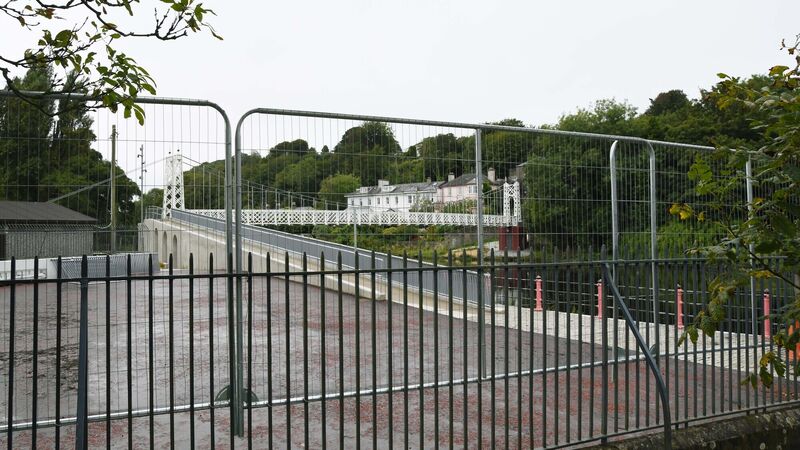Firms behind Cork's Shakey bridge restoration go into examinership

The bridge structure was removed, repaired and reinstated but work on the project ground to a halt during the summer before the final elements were finished after issues emerged with the main contractor. File pic: Denis Minihane.
Efforts to reopen Cork’s famous Daly’s bridge are ongoing, city officials have insisted, after two companies in the engineering group overseeing its high-profile restoration went into examinership.
An interim examiner has been appointed to L&M Keating Ltd (LMK), and Kilmihil Rental Store Ltd (KRS), two firms in the Clare-based Keating group, after the firm applied to enter voluntary examinership, blaming Covid-19, Brexit and the current trading environment.
The group, one of the country’s leading specialist building and engineering services companies, was working on several high-profile State projects when it made its application to the High Court.
As well as overseeing the renovation of Daly’s bridge - the near century-old pedestrian bridge and heritage structure and the last surviving pedestrian suspension bridge of its type in Ireland - it was also working on a massive €25m pier extension in Castletownbere, West Cork.
The company also oversaw the Mary Elmes bridge project in Cork city last year.
Keating won the contract last year to renovate and restore Daly’s bridge - affectionately known as the Shakey bridge because of its signature shake and wobble.
The bridge structure was removed, repaired and reinstated but work on the project ground to a halt during the summer before the final elements were finished after issues emerged with the main contractor.
Last month, in a report to city councillors, officials said the bridge is a valued feature of the transport and built heritage of the city and the completion of outstanding works and getting it open again is a priority for the council.
They said “significant works have been satisfactorily progressed under the contract” including the phased dismantling, restoration and re-erection of the bridge deck and towers.
But they said several critical elements have yet to be completed, including electrical, lighting works, completion of access ramps, hand and parapet railings, painting and landscaping.
Most of these works were described as “essential to the safe reopening of the bridge to public use” and councillors were told that the council was at an advanced stage in its engagements with the scheme contractor and subcontractors about completing the works.
They were told that finishing the project would take over two months and it was hoped to reopen the bridge for public use in December.
In an update this morning, City Hall said those negotiations are ongoing.
“Since works stopped suddenly on Daly’s Bridge, Cork City Council has been focussed on ensuring the timely re-opening of the refurbished bridge while ensuring the best return for public monies. This process is ongoing,” a spokesperson said.
The High Court was told earlier this month that Keatings had come under significant pressure from creditors and that was among the reasons for seeking court protection.
Some 600 trade creditors were owed a combined €9.9m at the end of August last and projections for the year ending December 2020 revealed a Revenue decrease of about 70% and a total EBITDA loss for the year of some €3.6m.
But the court was also told that an independent expert had expressed the view that the companies have a reasonable prospect of survival post-restructuring based on the fundamental strength of their core marine engineering business and subject to a number of conditions.
LMK employed 150 directly up to last June but had 91 full-time employees, of whom 45 are temporarily laid off, the High Court was told earlier this month.
Before Covid-19-related site closures, it had engaged an estimated 300 people indirectly through the supply chain. KRS has no direct employees.





